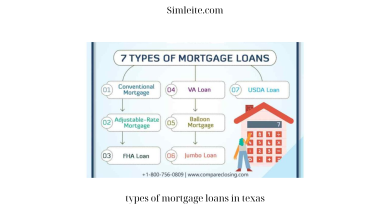Is a car loan a mortgage: Understanding Car Loans and Mortgages
Is a car loan a mortgage? In the realm of borrowing, car loans and mortgages stand as two of the most common financial products. Both serve as vehicles for financing significant purchases, yet they pertain to fundamentally different assets: vehicles and real estate, respectively. In this article, simleite.com embark on a journey to unravel the distinctions between car loans and mortgages, shedding light on their respective definitions, purposes, legal frameworks, financial implications, and factors to consider when choosing between them.
Is a car loan a mortgage?

A car loan, as its name suggests, is a financial product designed to facilitate the purchase of a vehicle. Borrowers obtain car loans from financial institutions such as banks, credit unions, or car dealerships, with the loan amount typically covering the purchase price of the vehicle minus any down payment. Car loans are structured with predetermined terms and conditions, including interest rates, repayment schedules, and loan durations, to be repaid over a specified period.
Definition and Purpose of Mortgages
In contrast, a mortgage is a type of loan specifically tailored to finance the purchase of real estate, such as a home or commercial property. Similar to car loans, mortgages are obtained from lenders and involve borrowing a specific amount of money to purchase the property. The property itself serves as collateral for the loan, with the lender having the right to foreclose on the property in the event of default. Mortgages typically span longer durations than car loans, often ranging from 15 to 30 years.
Key Differences Between Car Loans and Mortgages

One of the primary distinctions between car loans and mortgages lies in the collateral used to secure the loan. In the case of car loans, the vehicle serves as collateral, whereas mortgages are secured by the property being financed. Additionally, car loans tend to have shorter durations than mortgages, with terms typically ranging from three to seven years, compared to the decades-long repayment periods associated with mortgages. Interest rates and repayment terms also differ between car loans and mortgages, reflecting the differences in risk and lending practices associated with each type of borrowing.
Legal and Regulatory Differences
Car loans and mortgages are subject to distinct legal and regulatory frameworks, reflecting the unique characteristics of each type of borrowing. While both are governed by consumer protection laws and regulations, mortgages are subject to additional legal requirements due to the complexities of real estate transactions. For example, mortgage lenders are required to adhere to stringent disclosure requirements and provide borrowers with detailed information about loan terms, closing costs, and potential risks.
Financial Implications of Car Loans and Mortgages
The financial implications of taking out a car loan versus a mortgage can vary significantly, depending on factors such as interest rates, loan durations, and repayment terms. Car loans typically involve lower loan amounts and shorter repayment periods than mortgages, resulting in lower overall interest costs but higher monthly payments. Conversely, mortgages often entail higher loan amounts and longer repayment periods, leading to higher total interest costs over the life of the loan but lower monthly payments.
Factors to Consider When Choosing Between a Car Loan and a Mortgage

When deciding between a car loan and a mortgage, borrowers should consider a variety of factors, including their personal financial goals, budget constraints, and long-term plans. Factors such as the cost of the vehicle or property, the availability of financing options, and the impact on credit scores and financial stability should also be taken into account. Ultimately, the choice between a car loan and a mortgage depends on individual circumstances and priorities, and borrowers are encouraged to seek personalized financial advice to make informed decisions.
Common Misconceptions About Car Loans and Mortgages
Despite their prevalence, car loans and mortgages are often surrounded by misconceptions and myths that can influence borrowing decisions and financial planning. Common misconceptions include the belief that all car loans and mortgages are the same, leading to oversimplified comparisons and potentially suboptimal choices. By debunking these misconceptions and promoting a better understanding of the nuances of car loans and mortgages, borrowers can make more informed decisions and achieve greater financial security.
Conclusion
In conclusion, while car loans and mortgages both serve as vehicles for financing significant purchases, they are fundamentally different financial products with distinct characteristics and implications. Understanding the differences between car loans and mortgages is essential for borrowers seeking to make informed decisions about borrowing and financial planning. By recognizing the unique features of each type of borrowing and considering factors such as loan terms, interest rates, and collateral requirements, borrowers can navigate the borrowing process with confidence and achieve their financial goals.
